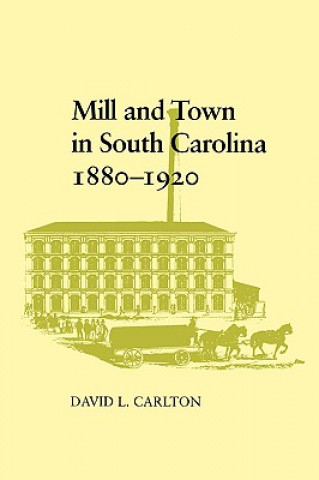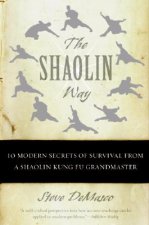
Kód: 11526995
Mill and Town in South Carolina, 1880-1920
Autor David L. Carlton
Probing the social repercussions of the industrial development of South Carolina in the decades following Reconstruction, David L. Carlton's Mill and Town in South Carolina, 1880-1920, tells of the conflict that erupted between th ... celý popis
- Jazyk:
 Angličtina
Angličtina - Vazba: Brožovaná
- Počet stran: 336
Nakladatelství: Louisiana State University Press, 1982
- Více informací o knize

Mohlo by se vám také líbit
-

My Unique Lifetime Association With Patrick Leigh Fermor
493 Kč -

Building Dioramas
648 Kč -

Motivation-in-a-box
792 Kč -

Shaolin Way
475 Kč -

Santa Claus - CD Only
307 Kč -

Scrum-Half to Full-Back - The Tactics and Techniques of Good Attacking Rugby
887 Kč -

Les Contes Enfantins
581 Kč
Darujte tuto knihu ještě dnes
- Objednejte knihu a zvolte Zaslat jako dárek.
- Obratem obdržíte darovací poukaz na knihu, který můžete ihned předat obdarovanému.
- Knihu zašleme na adresu obdarovaného, o nic se nestaráte.
Více informací o knize Mill and Town in South Carolina, 1880-1920
Nákupem získáte 87 bodů
 Anotace knihy
Anotace knihy
Probing the social repercussions of the industrial development of South Carolina in the decades following Reconstruction, David L. Carlton's Mill and Town in South Carolina, 1880-1920, tells of the conflict that erupted between the rising middle class of the South's small towns and the rural white who came to labor in the towns' burgeoning textile mills. The townsmen who built the mills initially expected no social friction to result from industrialization, since the work force was to consist entirely of white "Anglo-Saxons" like themselves. However, as thousands of rural whites moved into the mill villages at the turn of the century, their backwoods independence proved increasingly incompatible with the orderly, hierarchial outlook of the town people. As a result, the town people soon abandoned their belief in white equality and instead began to view the mill people as backward folk needing to be brought under the control of their betters. In keeping with the spirit of the Progressive era, the principal approach of the town people to the task of "uplifting" the mill people was through education. Through the creation of child labor and compulsory education laws they hoped to free the mill child from the hold of his parents and cement his allegiance to the new, more progressive world being forged under town leadership. This assault met with resentment and some opposition from the mill population, but the workers could put up little effective resistance until they were organized by the "demagogue" Cole Blease, whom they then helped to be elected governor in 1910. Blease's ascendancy, however, was brief. A progressive electoral victory in 1914 resulted in a new surge of reform, and by 1920 the use of the state government to "uplift" the poorer whites was an established practice. Tracing the social impact of southern industrialization from its beginnings to the ruse of the demagogue politicians of the early twentieth century, this study by David L. Carlton isolates the role of the textile mills in bringing increased rigidity and tension to the loose social structure of the preindustrial South. David L. Carlton grew up in a mill village in South Carolina and is associate professor of history at Vanderbilt University. For more information about the author, please visit his website at: www.vanderbilt.edu/AnS/history/carltodl/carltodl.htm
 Parametry knihy
Parametry knihy
873 Kč
- Plný název: Mill and Town in South Carolina, 1880-1920
- Autor: David L. Carlton
- Jazyk:
 Angličtina
Angličtina - Vazba: Brožovaná
- Počet stran: 336
- EAN: 9780807110591
- ISBN: 0807110590
- ID: 11526995
- Nakladatelství: Louisiana State University Press
- Hmotnost: 484 g
- Rozměry: 230 × 150 × 19 mm
- Datum vydání: 01. December 1982
Oblíbené z jiného soudku
-

Dune
217 Kč -

Haunting Adeline
620 Kč -

Berserk Deluxe Volume 2
1092 Kč -

White Nights
90 Kč -

Powerless
291 Kč -

Atomic Habits
509 Kč -

Dune Messiah
228 Kč -

Berserk Deluxe Volume 3
1142 Kč -

One Day
218 Kč -

Berserk Deluxe Volume 1
1115 Kč -

Iron Flame
354 Kč -

Surrounded by Idiots
303 Kč -

Harry Potter and the Prisoner of Azkaban (Minalima Edition)
993 Kč -

Gravity Falls Journal 3
440 Kč -

Heaven Official's Blessing: Tian Guan Ci Fu (Novel) Vol. 1
440 Kč -

The Creative Act
550 Kč -

Dune
204 Kč -

Hunting Adeline
642 Kč -

A Little Life
267 Kč -

Children of Dune
230 Kč -

Heaven Official's Blessing: Tian Guan Ci Fu (Novel) Vol. 2
479 Kč -

Bungo Stray Dogs, Vol. 8 (light novel)
404 Kč -

Percy Jackson and the Olympians 5 Book Paperback Boxed Set
953 Kč -

Solo Leveling, Vol. 1
443 Kč -

The Prisoner's Throne
268 Kč -

Court of Thorns and Roses
268 Kč -

Cry Baby Coloring Book
281 Kč -

Fourth Wing
353 Kč -

Icebreaker
199 Kč -

Berserk Deluxe Volume 6
1089 Kč -

Avatar, the Last Airbender: The Kyoshi Novels (Box Set)
833 Kč -

The 48 Laws of Power
601 Kč -

House of Leaves
462 Kč -

Twisted Lies
213 Kč -

Dune Messiah
277 Kč -

No Longer Human
339 Kč -

48 Laws Of Power
531 Kč -

Twisted Games
291 Kč -

Caraval Paperback Boxed Set
905 Kč -

Solo Leveling, Vol. 2
351 Kč -

Open Circuits
910 Kč -

Berserk Deluxe Volume 5
1119 Kč -

Heaven Official's Blessing: Tian Guan Ci Fu (Novel) Vol. 3
410 Kč -

Berserk Deluxe Volume 4
1292 Kč -

Court of Mist and Fury
268 Kč -

SOLO LEVELING V08
436 Kč -

English File Upper Intermediate Multipack A (4th)
487 Kč -

CHAINSAW MAN V14
253 Kč -

Before the Coffee Gets Cold
251 Kč
Osobní odběr Praha, Brno a 12903 dalších
Copyright ©2008-24 nejlevnejsi-knihy.cz Všechna práva vyhrazenaSoukromíCookies



 Vrácení do měsíce
Vrácení do měsíce 571 999 099 (8-15.30h)
571 999 099 (8-15.30h)